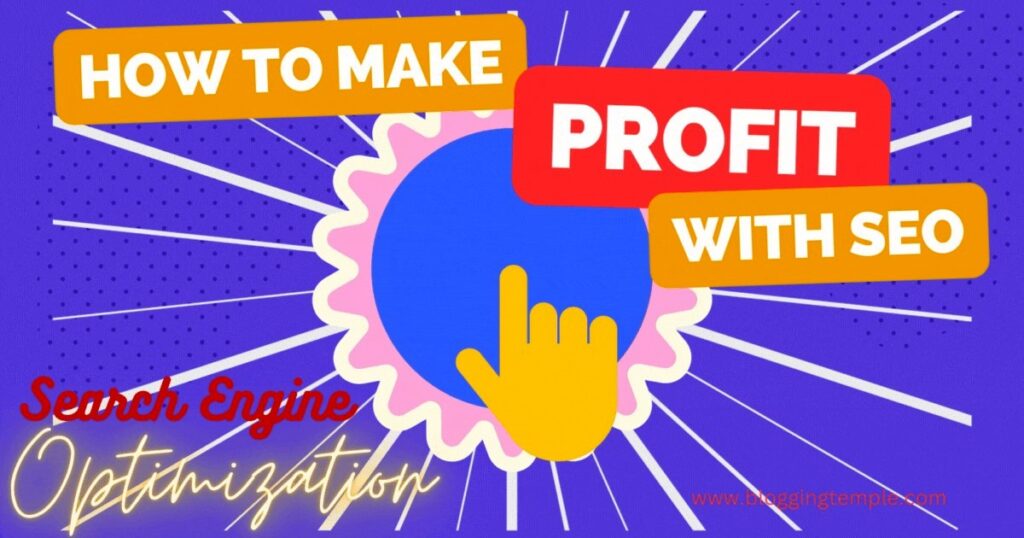Search Engine Optimization (SEO) is the process of optimizing your website and content to improve its ranking on search engines like Google, Bing, and Yahoo. The goal of SEO is to increase the quantity and quality of organic traffic to your website through search engine results pages (SERPs).
Table of Contents
Learn About Digital Marketing-https://bloggingtemple.com/what-is-digital-marketing-learn-earn/(opens in a new tab)

Meaning and Definition:
SEO stands for Search Engine Optimization. It refers to the process of optimizing a website or web page in order to improve its visibility and ranking on search engine results pages (SERPs). The ultimate goal of SEO is to increase the quantity and quality of traffic to a website from search engines, which can result in increased brand awareness, more leads, and higher sales or conversions.
SEO involves various techniques and strategies to increase the quantity and quality of traffic to a website from search engines. This includes optimizing the website’s content and structure, improving its technical performance, and building high-quality backlinks from other websites.
The ultimate goal of Search Engine Optimization is to drive more organic (unpaid) traffic to a website, which can result in increased brand awareness, more leads, and higher sales or conversions.
How to learn Search Engine Optimization(SEO):
Learning SEO involves a combination of theoretical knowledge and practical skills. Below are some steps you can follow to learn Search Engine Optimization:
- Read SEO guides and blogs: Start by reading beginner-level Search Engine Optimization guides and blogs that explain the fundamentals of Search Engine Optimization. Some popular SEO blogs include Moz, Search Engine Journal, Search Engine Land, and Neil Patel’s blog.
- Enroll in an SEO course: There are several online courses available that teach Search Engine Optimization from beginner to advanced level. Some popular Search Engine Optimization (SEO) courses include Yoast Academy, SEMrush Academy, and HubSpot Academy.
- Practice on your own website: Apply your SEO knowledge to your own website or blog to experiment with different techniques and see the results firsthand.
- Attend SEO conferences and events: Attend industry events and conferences to learn from experts, network with other Search Engine Optimization professionals, and stay up-to-date with the latest SEO trends and best practices.
- Join online communities: Join SEO-related online communities such as Reddit, Quora, and Facebook groups to ask questions, share your experience, and learn from others.
- Use SEO tools: Use SEO tools such as Google Analytics, Google Search Console, SEMrush, Ahrefs, and Moz to monitor your website’s performance, analyze your competitors, and find new opportunities.
- Keep learning: Search Engine Optimization (SEO) is an ever-evolving field, and new updates and changes occur regularly. Stay up-to-date with the latest changes by following SEO blogs, attending events, and continuously learning and experimenting with new strategies.
By following these steps and continuously practicing and experimenting, you can develop a strong understanding of Search Engine Optimization and become a successful SEO professional.
SEO Involves Several Techniques and Strategies, Including:
- Keyword research: Finding the right keywords that your target audience uses to search for products or services related to your business.
- On-page optimization: Optimizing your website structure, title tags, meta descriptions, headings, content, and images to make them more search engine friendly.
- Off-page optimization: Building backlinks or inbound links to your website from other authoritative websites, social media, or business directories to increase your website’s authority and credibility.
- Technical SEO: Improving your website’s technical aspects such as site speed, mobile responsiveness, XML sitemaps, and robots.txt files.
- Local Search Engine Optimization: Optimizing your website for local searches, including local keywords, Google My Business listings, and local business directories.
- Content marketing: Creating high-quality, informative, and engaging content that answers users’ queries and helps you rank higher on search engines.
- Analytics and reporting: Tracking your website’s traffic, ranking, and performance using tools like Google Analytics and Google Search Console.
Search Engine Optimization requires patience, consistency, and continuous optimization to achieve the desired results. By implementing the right SEO strategies, you can improve your website’s visibility, attract more traffic, and increase your brand awareness and revenue.

Learn to Improve your knowledge: https://www.binaryeducation.in/
Basic SEO Tools:
There are many SEO tools available that can help you with different aspects of search engine optimization. Here are some popular ones:
- Google Analytics: A free web analytics tool that helps you track and analyze your website’s traffic and user behavior.
- Google Search Console: A free tool from Google that helps you monitor your website’s performance in Google search results and identify issues that may be affecting your website’s visibility.
- Ahrefs: A comprehensive SEO tool that provides keyword research, backlink analysis, content analysis, and competitor analysis.
- SEMrush: A powerful all-in-one SEO tool that provides keyword research, on-page optimization, backlink analysis, and competitor analysis.
- Moz: A suite of SEO tools that includes keyword research, site audit, on-page optimization, and link building tools.
- Screaming Frog: A website crawler that helps you identify technical Search Engine Optimization issues on your website such as broken links, duplicate content, and missing meta tags.
- Yoast SEO: A popular WordPress plugin that helps you optimize your website’s content for Search Engine Optimization and provides on-page optimization suggestions.
- Majestic: A backlink analysis tool that helps you understand your website’s link profile and monitor your backlink health.
- Google Keyword Planner: A free tool from Google that helps you find relevant keywords for your website and provides insights into search volume and competition.
These tools can help you optimize your website and improve your search engine rankings. However, it’s important to remember that Search Engine Optimization is a complex and ever-evolving field, and no tool can guarantee results. It’s important to use these tools as part of a broader SEO strategy and to constantly monitor and adjust your tactics based on the results.
Digital Marketing Kya Hai- In Hindi https://bloggingtemple.com/digital-marketing-kya-hai-learn-earn/(opens in a new tab)
FAQs:
Ques: What is SEO?
Ans: SEO stands for Search Engine Optimization, which is the practice of optimizing a website or web page to increase its visibility and ranking on search engine results pages (SERPs).
Ques: Why is SEO important?
Ans: Search Engine Optimization is important because it can help businesses improve their online visibility, attract more organic traffic to their website, and ultimately increase conversions and revenue.
Ques: What are the key components of SEO?
Ans: The key components of Search Engine Optimization include keyword research, on-page optimization, technical optimization, content creation, link building, and analytics and reporting.
Ques: What is keyword research?
Ans: Keyword research involves identifying the words and phrases that people use to search for information related to your business or industry. These keywords are then used to optimize your website and content for better search engine visibility.
Ques: What is on-page optimization?
Ans: On-page optimization involves optimizing individual web pages on your website to improve their relevance and visibility to search engines. This includes optimizing page titles, meta descriptions, header tags, and content.
Ques: What is technical optimization?
Ans: Technical optimization involves improving the technical aspects of your website to make it easier for search engines to crawl and index your pages. This includes optimizing page speed, mobile responsiveness, and site architecture.
Ques: What is content creation?
Ans: Content creation involves creating high-quality, informative, and engaging content that is optimized for search engines and designed to attract and engage your target audience.
Ques: What is link building?
Ans: Link building involves acquiring backlinks from other websites to your own website. Backlinks are an important ranking factor in search engine algorithms and can help improve your website’s visibility and authority.
Ques: What is analytics and reporting?
Ans: Analytics and reporting involve tracking and analyzing data related to your website’s performance in search engines, such as traffic, rankings, and conversions. This data is used to identify areas for improvement and measure the success of your SEO efforts.
Ques: What is a search engine algorithm?
Ans: A search engine algorithm is a complex set of rules and calculations used by search engines to determine the relevance and ranking of web pages in search results. The exact algorithms used by search engines are generally kept secret to prevent manipulation, but SEO experts use best practices and industry knowledge to optimize their websites for better search engine visibility.
Ques: What are some common SEO mistakes to avoid?
Ans: Some common Search Engine Optimization mistakes to avoid include keyword stuffing, duplicate content, broken links, slow page speed, and ignoring mobile optimization. It’s important to keep up with the latest SEO best practices and avoid any tactics that are considered spammy or manipulative.
Ques: How long does it take to see results from SEO?
Ans: The time it takes to see results from Search Engine Optimization can vary depending on a number of factors, including the competitiveness of your industry, the quality of your website and content, and the amount of effort put into your SEO strategy. Generally, it can take several months to a year to see significant improvements in search engine rankings and traffic.


0 thoughts on “How to Learn Search Engine Optimization (SEO)- Full Guide in 7 Easy Steps”